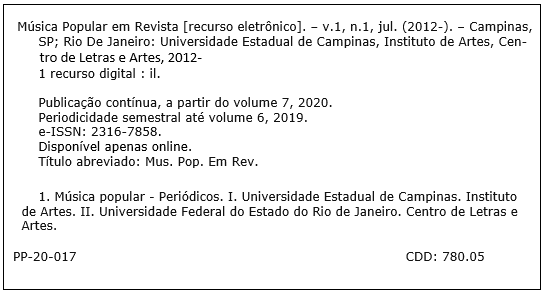Focus and Scope
The purpose of this publication is to create a space designed to stimulate intellectual debate and the exchange of experiences between researchers from different areas of knowledge who choose popular music as an object of study. Through the publication of scientific texts with a solid theoretical and methodological foundation Música Popular em Revista aims to contribute to the consolidation of a relatively new interdisciplinary academic field, which has been forming since the middle of the last century, and to the deepening of the investigation of popular music studies. Popular music is here understood as the form of musical art of a song or instrumental format that has been defined historically in opposition, on the one hand, to music which privileges written traditions, also called “cultured” or “classical”, and, on the other, to musical practices of oral tradition, linked to forms of community life and generally associated with rurality. Throughout the 19th century, this type of music became an autonomous field within the context of the formation and expansion of the marketplace of cultural goods in the main European and North American metropoles, circulating mainly in entertainment spaces such as café-concert, music hall, vaudeville and operetta. With the advent of sound recording techniques at the end of that century, which culminated, at first, in Thomas Edison's phonograph, and which later evolved into the electrical (analog) system of sound recording, the digital system (Compact Disc - CD) and the audio compression method that made the production and circulation of music via the Internet feasible, this field was even further consolidated. The entire productive structure, set on a technological foundation that has developed over decades has, in a way, constituted the formal and poetic aspects of this symbolic asset. As a result, an immense network of production, circulation and consumption of popular music, global in scope, was formed, allowing this artistic modality to occupy increasingly broad spaces in everyday life, mobilizing emotions and creating subjectivities and collective identities. Due to its complexity and multidimensional character, popular music requires analytical approaches anchored in theoretical and methodological frameworks constructed from and appropriate to multiple and diverse epistemologies.
Peer Review Process
The evaluation of contributions is carried out in a continuous flow in the order in which they are submitted. The MPR adopts the double-blind evaluation system and, therefore, any information that can identify the authors should be avoided.
The evaluation process consists of three phases:
- Pre-Selection: carried out by the Editors will assess whether the contributions comply with the MPR submission rules.
- Merit Evaluation: performed by at least two evaluators, who cannot belong to the same institution as the authors.
- Editing and Publication: carried out by the editors, who will make the organization and final edition for online publication
To be considered approved, the two evaluators must indicate the contribution for publication. If there is a disagreement between the evaluators, the contribution will be sent to a third evaluator.
If approved with modifications, authors will receive a deadline to make the suggested changes and resubmission of contributions. In this case, the contributions will again be sent to the evaluators, who will assess whether the changes were made by the authors.
Periodicity
MPR accepts original contributions in the form of articles, translations, essays, reviews, interviews, commented transcriptions, and scores to be published on an ongoing basis, as its evaluation, review and layout process is completed.
Journal History
With the advent of the recording industry in the early 20th century, popular music became its main product. Gradually, a multiplicity of popular musical manifestations was removed from their original spaces - usually marked by community forms of sociability and by ritualistic practices of a playful-religious character - and converted into phonograms.
As a product, popular music gained new spaces for circulation and enjoyment. Today it is practically impossible to investigate the nature of popular music without considering this new context. Due to the reach of the media, even those modalities that still transit circuits parallel to those of the phonographic market seem not entirely exempt from influences of the recorded music repertoire.
The research group "Música Popular: História, Produção e Linguagem" was created in 2002. Formed by researchers from the State University of Campinas (UNICAMP) and formalized at CNPq, it aims to deepen the understanding of the origins and transformations of popular music, and its relations with society. This is done through the investigation of the cultural matrices that form the different styles and languages by means of the analysis of its formal elements, intrinsic to the musical material, and from its different historical and socio-cultural contexts.
This journal appeared in 2012 as a vehicle to socialize the production of the research group, as well as to gather and disseminate the work of external researchers in this field of knowledge and in related areas. In the same year, during the process of its creation, an invitation was made to UNIRIO's Graduate Music Program to join the editorial committee, in which it still participates.


